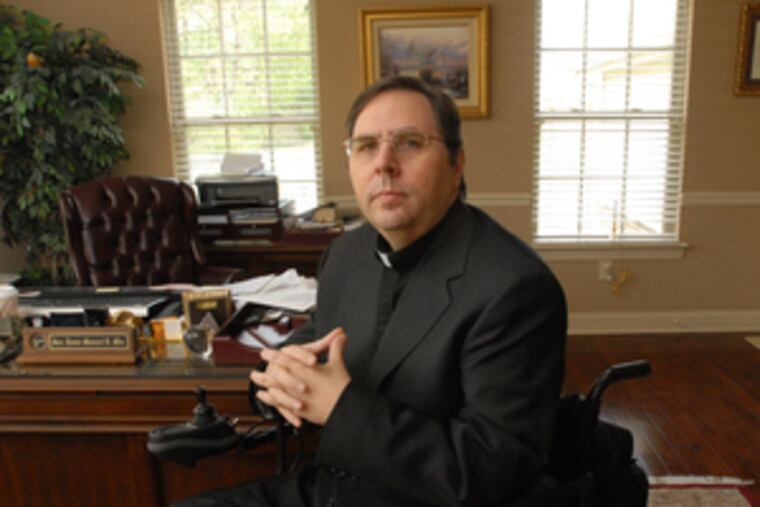Daniel Rubin: Priest in wheelchair faces eviction
"Excuse me for not getting up," Msgr. Louis Marucci says, offering his hand. "It's not going to happen." He's received me in his rectory at St. Vincent Pallotti Catholic Church in Haddon Township to talk about the bad news - the Camden Diocese has announced plans to merge his parish with another.

"Excuse me for not getting up," Msgr. Louis Marucci says, offering his hand. "It's not going to happen."
He's received me in his rectory at St. Vincent Pallotti Catholic Church in Haddon Township to talk about the bad news - the Camden Diocese has announced plans to merge his parish with another.
That move would force him from the only church in the diocese that is wheelchair-accessible and make him give up the first parish he's ever led, something he loves.
But first, a story.
It was 1987, he begins. He'd just been ordained as a priest, and he was starting to trip over his feet. "It just seemed odd to me," he says. He had an hour to prepare his harp for a recital featuring "Variation on a Theme of Greensleeves."
Only, every time he tried to hit a flat or a sharp on the floor pedals, his right foot landed clumsily.
Doctors would wonder whether he'd bumped his leg, causing nerve injury. Then his left foot went dead. Next he started seeing double.
When the tests were through, his diagnosis was multiple sclerosis. In August 1988 he was 29 and he'd lost the use of his legs.
"I wondered," he says, moving his arms as if conducting an orchestra, "how was I going to function in a wheelchair, function as a priest?"
One moment gave clarity. It was that fall, 1988, and he was celebrating his first Mass in a wheelchair. Before his illness, he used to greet parishioners after the service.
Someone else's world
"I remember doing something very foolish, my first Mass back. I grabbed a folding chair and I put it at the end of the aisle" for parishioners to sit on as he greeted them. No one did.
"My presumption was that people were going to enter my world. What I quickly learned was that if I'm going to survive this, I'm going to have to survive in their world."
Now 48, he calls his disability his cross and crown. The cross is having a chronic disease that attacks the autoimmune system. The crown? He says multiple sclerosis has deepened his relationship with God. "I like to say that you never know you have a need for the Lord until you really have a need for the Lord." And Marucci has need.
At the same time, he is coping, and more. He found new ways of dressing and driving. He plays wheelchair racquetball.
There's a story behind the poster-size photograph on his door. It shows him at Breckenridge in Colorado, flying down the mountain in a specially contoured bowl with a ski mounted on the bottom.
"The most beautiful part," he says, "is to ski in total control and to look down at your wheelchair parked by itself under a tree."
Different, not disabled
He says he wouldn't be the person he is today without his disease. He's not sure he would have pursued a doctorate in biomedical ethics had he not become sensitive to the treatment of the gravely ill.
The first line of his thesis read: "My parents might have liked me to grow up to become a doctor, but instead I became a patient."
After years of administrative work, he was given his first parish to lead in January 2002. The church is accessible to the handicapped, and many people with hearing, sight and physical disabilities belong. Just this spring parishioners dedicated the space after raising more than $1 million for renovations.
He describes a service from two weekends ago where, when it was time to offer the gifts of bread and wine, a woman in a wheelchair was able to propel herself all the way up to the altar. St. Vincent Pallotti, he said, is a parish for all.
The church is to merge with St. Aloysius, a church that requires climbing five steps to worship.
Though his parishioners talk of appealing the decision to the Vatican, Marucci takes heart in the most recent letter from Bishop Joseph A. Galante. The diocese won't make a final decision before an independent council examines the facilities' accessibility.
"I see that as a possibility," says Marucci, who has overcome a few obstacles before.